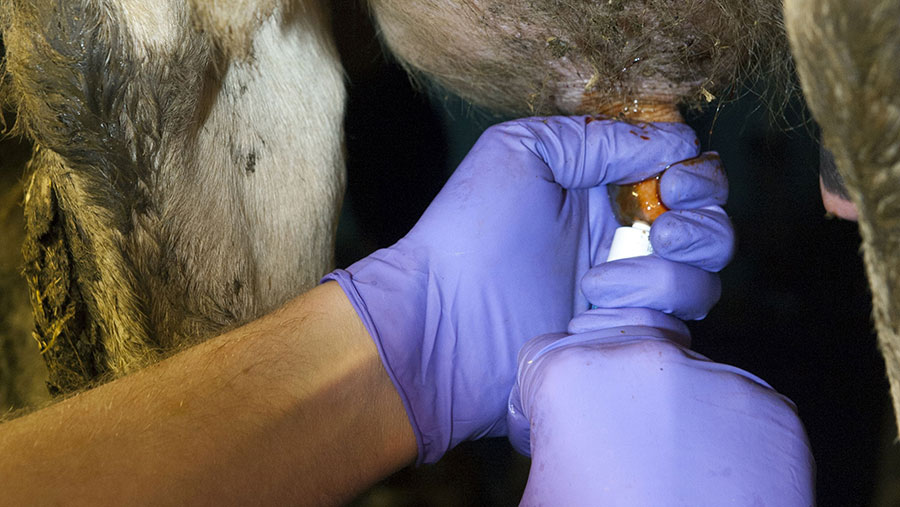Campaigners ramp up pressure on farm antibiotics use
 © FLPA/Wayne Hutchinson/REX/Shutterstock
© FLPA/Wayne Hutchinson/REX/Shutterstock Four campaign groups have launched a joint attack on antibiotics use in farming, calling for a ban on routine treatment and pressing supermarkets to take a tougher stance with suppliers.
The Alliance To Save Our Antibiotics (ASOA) said antibiotics resistance was developing and there was an urgent need to cut antibiotics use on farms.
A report by the group – Real Farming Solutions to Antibiotic Misuse [PDF] – released in earlier this month, urged the government, retailers and the farming industry to act.
See also: In numbers – how farm antibiotics use has fallen in the livestock sector
It called on farming to adopt more extensive systems to reduce disease build-ups.
The report cites research across all livestock and poultry sectors backing the ASOA claim a move towards more extensive production systems would reduce antibiotics usage.
For example, it said lower stocking densities in housed animals reduced the disease challenge, limiting the need for antibiotics treatment.
Regulatory demand
But the ASOA also used the report to call for regulatory action by the government.
“It is remarkable that in 2017 it is still entirely legal to feed antibiotics to groups of animals when no disease has been diagnosed,” the report said.
“The solution to this problem is clear – a ban on preventative group treatments.”
As well as the calls to government and the farming industry, the report exposed the differing buying policies of nine supermarkets, putting pressure on those with a more relaxed approach.
And the ASOA pledged to begin monitoring supermarket practice on antibiotics on an annual basis.
It praised five supermarkets which already had clear bans on their suppliers using antibiotics preventatively.
- Co-op
- Marks & Spencer
- Sainsbury’s
- Tesco
- Waitrose
Of the others, it said Morrisons had a ban on routine use for some farm sectors while Aldi imposed restrictions but had no outright ban. The remaining two investigated, Asda and Lidl, only adhered to the minimum legal restrictions, the report said.
NPA pride
Reacting to the report, the National Pig Association (NPA) said it recognised the need to reduce antibiotics use on farms.
But NPA senior adviser Georgina Crayford said it was too simplistic to link production systems and antibiotics use.
Dr Crayford also highlighted the huge amount of work going on across all sectors to reduce antibiotics treatments.
At the launch of the ASOA report, Dr Crayford said the NPA was “really proud” of the reductions recorded in antibiotics use in pigs, including a 73% reduction in critically important antibiotics taking them to just 0.1% of total usage in pigs.
RUMA response
Gwyn Jones, chairman of the Responsible Use of Medicines in Agriculture (Ruma), alliance welcomed ideas in the report.
But he warned that treating and preventing disease is complex, which is is why bans can be ineffective with unintended consequences for animal welfare.
“The success in the farming industry achieving a 27% reduction in antibiotic sales over two years and dramatic reductions in highest priority antibiotics is that it has happened with neither bans nor regulation. It has come from a supportive supply chain and regulator – the Veterinary Medicines Directorate – and commitment across the whole RUMA alliance from farm to fork.
“There’s lots more to do – not least improve data collection and sharing, and expand the collaborative, pre-competitive work of the retailers to the wider supply chain. But the fundamental change in focus we are seeing among vets and farmers is down to support and leadership, not sanctions.”
NFU chief animal health and welfare adviser Catherine McLaughlin said: “The farming industry has already committed a lot of hard work to reduce antibiotics use on farm and the industry has achieved antibiotics-use targets two years early, according to recent data.
“These results are clearly extremely positive for the industry and has been a collaborative effort with farmers, vets, government and the wider industry. As an industry, we must continue the good work and look to further reduce antibiotics use in a responsible manner.”
Alliance to Save Our Antibiotics
- The four members of the alliance are:
- Welfare group Compassion In World Farming
- Sustainable farming body Sustain
- Organic farming charity The Soil Association
- Ethical funding group The Jeremy Coller Foundation
Alliance to Save Our Antibiotics demands
- Regulatory ban on antibiotic use among animals not diagnosed with disease
- Restrictions on use of critically important antibiotics
- Legislation to promote extensive farming systems
